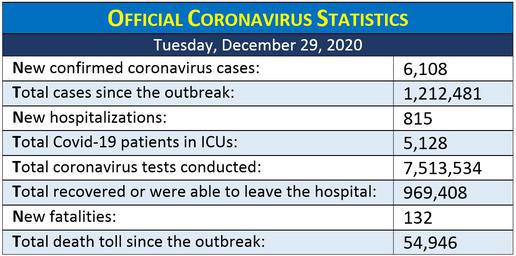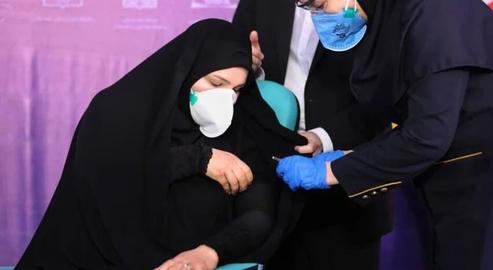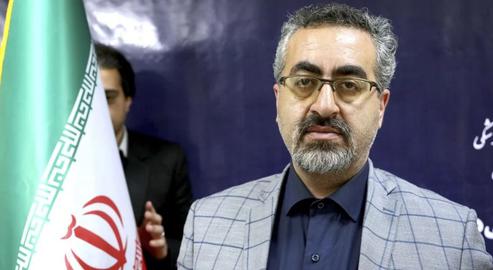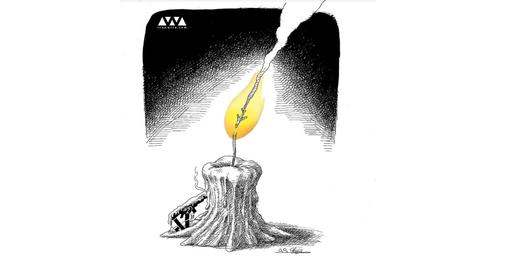After several weeks of back-and-forth over the prospect of an Iranian-made coronavirus vaccine, Iranian officials have finally reported that clinical trials are under way. Furthermore, a health ministry official has said this vaccine would have no need of a permit from the World Health Organization (WHO) in order to be used inside Iran.
Three people received the first injections of the trial vaccine on Tuesday, December 29 in a ceremony at a Tehran hotel attended by the health minister and other officials. Iranian state TV announced that none of the injections had so far caused “fevers” or “bodily shocks”.
“I am happy that the scientific process went ahead in a proper way,” said Tayebeh Mokhber, daughter of the chairman of Executive Headquarters of Imam's Directive (known as “Setad”), who was the first to receive the trial drug. “I hope the conclusion will be health for our people.”
Setad, a foundation controlled by the office of Iran’s Supreme Leader, has been overseeing the development of the vaccine being produced by Shifa Pharmed, part of a state-owned pharmaceutical conglomerate known as Barekat. The other two recipients of the vaccine on Tuesday were also senior Setad-affiliated executives.
The vaccine, dubbed CovIran Barekat, uses a deactivated form of SARS-CoV-2 to trigger an immune response. Leading Western vaccines, like the one made by Pfizer and its German partner BioNTech, have used newer technology to target the coronavirus’s spike protein using RNA.
Health Minister Saeed Namaki, who attended the ceremony, said the testing of a vaccine on these three individuals was intended as a message to the Iranian people that officials of the Islamic Republic have faith in the vaccine. Earlier it had been claimed that the vaccine would be tested on just 56 individuals selected from among 65,000 applicants.
Alireza Hosseini, director of the clinical studies for the vaccine, said the next round of vaccinations would take place in two weeks and the results would be announced 28 days later on February 9, one day before the anniversary of the 1979 Islamic Revolution.
No Need for World Health Organization’s Permission
Kianoush Jahanpour, speaking for Iran’s Food and Drug Administration, re-iterated that the start of clinical trials does not mean that this product is ready for mass deployment. “When the vaccine receives its final certification,” he said, “the ability to mass produce it will be in place...The important thing is the outcome of the clinical trial and if it is finally validated then the capability exists to produce at least 80 to 100 million doses in 1400 [the Iranian calendar year that starts on March 21] but, before that happens, all phases of the clinical trial must be validated by the Food and Drug Administration.”
Jahanpour emphasized that any vaccine used in Iran must be approved by the Food and Drug Administration, regardless of whether it is imported or made in Iran. “We might send the documentation to the World Health Organization but to use it inside the country there is no need for the WHO’s approval and everything is done with permits from the Food and Drug Administration,” he said. “But if, at any time, we want to export the Iranian vaccine, we must get a permit from the WHO or related international organizations, or the destination countries.”
“Do Not Declare Victory”
Criticizing statements by some government officials that have said coronavirus had been “defeated”, Nahid Khoda Karami, a member of Tehran City Council, said that “I ask officials to allow infections and fatalities from this disease to drop to zero before they declare victory... because otherwise people’s trust will be undermined.”
Warning that a new wave of coronavirus infections is still perfectly possible, she pointed out that around 5,000 people are now hospitalized in ICUs and people must not assume that the epidemic is over.
Provinces Round-up
In Tehran province, in the past 24 hours 290 new Covid-19 patients were admitted to hospital, 108 of them in ICUs, reported Dr. Alireza Zali, director of Tehran Coronavirus Taskforce. During the same time period 4,600 outpatients visited medical centers and 300 patients were discharged from hospitals. According to Dr. Zali, currently 2,332 Covid-19 patients are hospitalized in the province, of whom 932 are being treated at ICUs.
The number of Covid-19 fatalities in Tehran has dropped by 69 percent from November 21 to December 26, reported Dr. Zali. “During the same period, compared to the first two months of autumn, the rate of hospitalizations at common wards fell by 57 percent and at ICUs by 37 percent,” he said. “The number of outpatients also fell by 57 percent.”
In the past 24 hours 29 confirmed coronavirus cases were hospitalized in Kerman, bringing the total number of the hospitalizations in the province to 245, reported Kerman University of Medical Sciences. In the same time period 11 other confirmed Covid-19 patients died and the official death toll from coronavirus in the province rose to 2,328.
In Kurdistan, 58 new coronavirus cases were hospitalized, bringing the total number of hospitalizations in the province to 154. The biggest share of hospitalizations, 83 in total, has occurred in the provincial capital of Sanandaj. With the death of one confirmed case in the past 24 hours, the official Covid-19 death toll in Kurdistan is now 1,031.
In the past 24 hours, with the deaths of 19 more Covid-19 patients, the death toll in Fars exceeded 3,000 thousand, reported Abdolrasoul Hemmati, vice president of Shiraz University of Medical Sciences. Currently 625 suspected and confirmed Covid-19 cases are hospitalized across the province, 139 of them in intensive care units.
Iran’s Latest Coronavirus Statistics
In her daily briefing for December 29, health ministry spokeswoman Dr. Sima Sadat Lari announced the official coronavirus statistics for the past 24 hours:

Dr. Lari reported that currently no Iranian city is on red alert, 108 cities are in an orange state of alert and 340 are rated yellow.
visit the accountability section
In this section of Iran Wire, you can contact the officials and launch your campaign for various problems



























comments